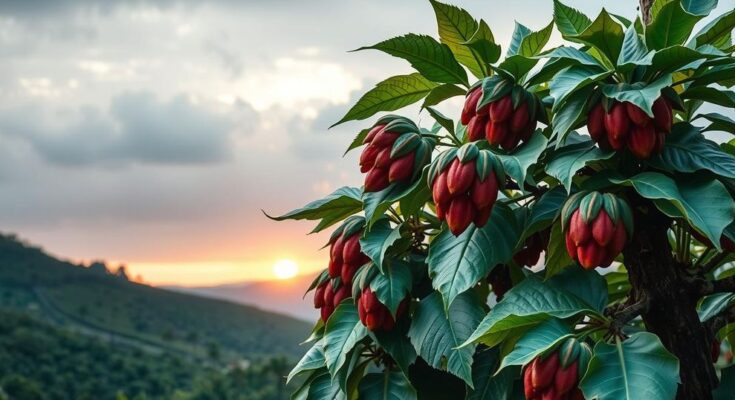Climate change is significantly affecting cacao production in West Africa, leading to reduced harvests and skyrocketing cocoa prices. A study by Climate Central found that higher temperatures threaten optimal growing conditions, while Christian Aid highlights the risks posed to farmers. The cocoa market reacts to these pressures, with price hikes becoming necessary for manufacturers to adjust to rising costs.
A recent study highlights the severe impact of climate change on cacao production, primarily in West African countries crucial to the global chocolate supply. Research indicates that rising temperatures, attributed to the greenhouse gas emissions from fossil fuels, are becoming increasingly common, affecting the main growing seasons in the Ivory Coast, Ghana, Cameroon, and Nigeria. This has led to disruptions in crop yields, including a surge in cocoa prices, reaching unprecedented levels.
Specifically, the report by Climate Central reveals that climate change has resulted in an extra three weeks of temperatures exceeding 32 degrees Celsius during the growing season in Ivory Coast and Ghana. During the record-breaking heat of the previous year, regions saw temperatures surpassing this critical threshold on 42 days, causing adverse effects on both the quantity and quality of cocoa harvests. Additional challenges such as pest infestations and irregular rainfall have compounded these difficulties.
Christian Aid has also expressed concerns regarding the vulnerability of cocoa farmers in West Africa to changing weather patterns. Their findings indicate extreme fluctuations, with the region oscillating between excessive rainfall hindering crops and subsequent drought conditions. Osai Ojigho, the director of policy and public campaigns for Christian Aid, emphasized the importance of cocoa farming to the livelihoods of the poorest farmers and the risks posed by climate change.
The consequences of these challenges are evident in the cocoa market, where prices have surged sharply since late 2023. Current New York cocoa prices have exceeded $10,000 per tonne, marking a significant rise from historical averages. Furthermore, leading chocolate manufacturers, like Lindt & Spruengli, have announced price increases to manage the heightened cost of cocoa products.
Experts stress that the future of cacao production faces an existential threat due to ongoing drought conditions in producing areas. Narcisa Pricope, a professor at Mississippi State University, notes that over the past three decades, over three-quarters of global land has experienced increased aridity, primarily due to greenhouse gas emissions and land degradation. Therefore, collective efforts are essential to combat this issue, not only for the chocolate industry but also for the sustainability of the planet at large.
The research underscores the critical impact of climate change on the cacao industry, threatening the livelihoods of farmers and driving cocoa prices to record highs. Increased temperatures and erratic weather patterns disrupt harvests, prompting significant concerns among agricultural researchers and humanitarian organizations. As climate challenges escalate, proactive measures for sustainability are imperative to secure both food resources and environmental health.
Original Source: www.sciencealert.com




